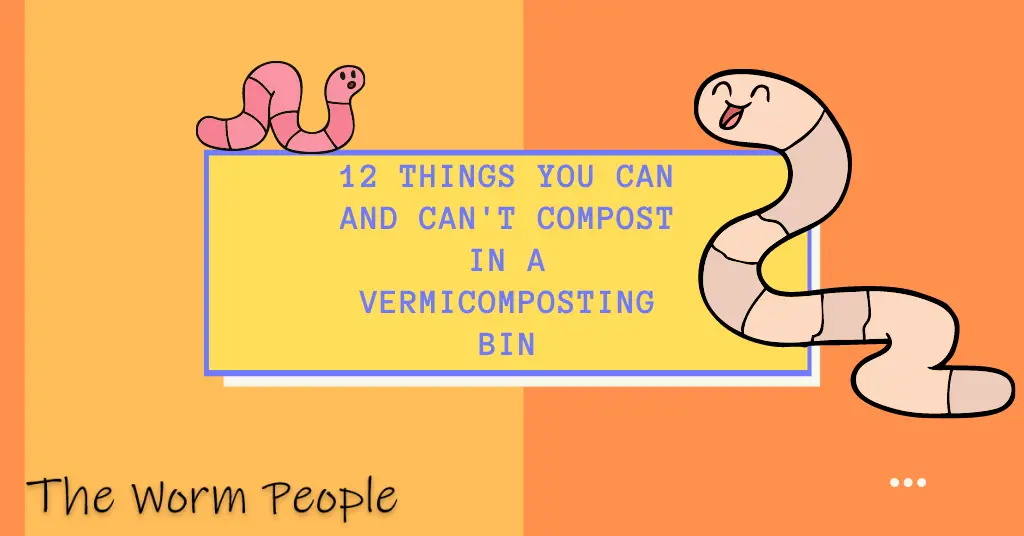
Jeffery Jago is a expert in horticulture and worm breeding. With a background in plant cultivation
Last Updated on July 10, 2021 by Jeffery Jago
Knowing what you can put into your vermicomposting bins that won’t kill your worms is a never-ending battle of research and google searching.
Worms are very sensitive creatures and adding the wrong things to their bin can be the difference between success and mass die-offs.
Can You Compost Dog Poop?
The good news, Dog poop will not harm your worms in your composting bin. Redworms have no problems breaking down dog waste into a lovely safe fertilizer for your garden.
It can also be composted in a none vermicomposting bin with a few added steps. Without worms to help break it down, You will need to make sure it obtains the correct heat temperature to break down some of the nastier bacteria.
Can You Compost Paper Towels?
Yes, paper towels can be added to the composting bin. Redworms are able to break down most of what is contained in a paper towel into useable fine soil for your garden or house plants.
If you used the paper towel to clean up any household chemicals, it’s best to leave that out of the bin. The chemicals in the paper towel could hurt your worms. This includes things like floor cleaner, Bleach, floor waxes, dish soaps, etc.
Can You Compost Egg Shells?
This is a classic, Absolutely. You can compost and vermicompost eggshells with ease. One thing to consider however is the drastic increase of pH eggshells tend to cause. Be sure not to use too many at once or the risk of killing your worms will go up.
Just break them up and sprinkle them around, and the worms will eat ’em up.
Can You Compost Cardboard?
You can compost cardboard, in fact, it should be one of the main layers you use when starting out your worm bin. Corrugated cardboard creates excellent initial bedding for a new bin that both serves as cover as well as food for your worms.
It breaks down without issue. Just avoid any boxes that contained chemicals or that are too heavily dyed. The dye usually won’t hurt the worms, but I suspect it’s not entirely healthy for them either and may lead to a shorter individual lifespan.
Can You Compost Onion?
Onions are not a good choice in a vermicomposting bin. For the most part, you should avoid adding acidic foods in with your worms as they are rather delicate to the changes in pH.
The good news is, Onions are perfectly fine to compost in a regular none worm composting pile or bin. They break down pretty nicely into good compost.
Can You Compost Rice?
You can totally add rice to your compost bin. You might notice it starts to turn moldy quite rapidly. This is normal and to be expected, do not panic. It’s all part of the breakdown nature of rice. This mold will not hurt your worms at all.
The same rings true for oats, and grains.
Just be sure that the rice isn’t slathered in oils or sauces, as these aren’t good for the worms. Curry for example should not be composted with your worms.
Things of that nature should be added to a heated compost pile to aid the breakdown process. These heated piles get far too hot to sustain worm life.
Compost Corn Cobs?
Corn cobs can be thrown in with your composting worms, just be sure it is completely dry before adding them to the bin.
Be aware that corn cobs take a very long time to break down, even with worms eating it. It’s best to burry them into the compost itself rather than leave them on the surface.
You should also be sure to remove as much butter as possible as this will go rancid as well as could harm the worms. Remove all salt to the best of your ability as well. These things can be accomplished by boiling or running them under hot water.
Can You Compost Weeds?
Worms will eat weeds with zero issues. However, consider allowing them to age and rot for a time before adding them to the bin to aid in the breakdown proccess.
This is easily done by tossing them in a pile or in a bucked with some dead leaves and a bit of water to make everything damp.
After a few weeks, they should be broken down and soft enough to add to the bin and break down much quicker this way.
Can I Compost Orange Peels?
Most worm species will not eat fresh orange peels. They won’t eat much of any fresh citrus peel.
It’s important to allow the peels to rot quite a bit before placing them in your worm bin to be eaten and broken down.
You also shouldn’t add too many because of the acidic nature of citrus peels.
In the end, there is not really any danger of adding them to your worm bin, you just need to age them first and then use them sparingly.
With all that said, They are probably best left to be composted in a heated compost pile that does not contain worms. The heat will age and decompose them much quicker without any risk to your worms.
Can I Compost Coffee Filters?
Coffee is fairly acidic, however, coupled with some crushed eggshells can be fine to add to your worm bin. Worms do seem to love caffeine, and it might even make them more ferocious when it comes to breaking down the bin content.
That last bit of course is just a personal observation.
Can You Compost Cheese?
Adding cheese to your vermicomposting bin isn’t advisable. Aside from the high salt and fat content, more often than naught your cheese will attract pests and other insects to your bin.
Springtails and random flies and other pests will likely break down the cheese before the worms ever get a chance.
Another thing to consider is the smell of rotting cheese. It’s very pungent and not something you want around your worm bin.
Cheese is best left to normal high heat composting piles or disposed of in traditional methods.
Can I Compost Ashes?
In vermicomposting and regular composting, wood ash is a hard no. When wood ash get’s wet, it basically turns into a hardcore acid that kills everything, including bacteria, worms, isopods, springtails, etc.
If your bin has high-fat content foods, it gets even worse! The highly acidic wood ash will turn into soap when it binds with the fat. This will ruin your bin, and it will need to be emptied out and cleaned to start over.


